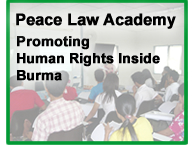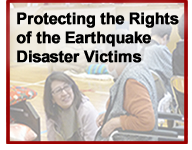~ Human Rights shall be the center for international assistance~
Human Rights Now 06 July 2012
Statement on the Tokyo Conference on Afghanistan.pdf
Statement on the Tokyo Conference on Afghanistan
~ Human Rights shall be the center for international assistance~
Human Rights Now
06 July 2012
Ten years have passed since the Afghanistan War in 2001 and the collapse of the Taliban regime. However, despite the support of the international community, it is hard to say that people in Afghanistan have become free from fear and deficiency, and human rights, democracy, and peace building have not been realized. Supporting states should seriously review the over ten-year engagement of the international community and failures of intervention, and consider how the international community should deal with Afghanistan from now on.
At the supporting states meeting held in Tokyo, Human Rights Now, a Tokyo based
international human rights NGO requests following to supporting states.
1. The respect for international human rights and humanitarian laws, and subjugation of impunity
According to the United Nations (UN), 1 civilian deaths in armed conflicts between government forces, the International Security Assistance Force (ISAF), and antigovernment forces have rather increased: 2412 civilians in 2009, 2790 in 2010, and 3021 in 2011.
Of these the majority of deaths were in antigovernment forces, and the United Nations Assistance Mission in Afghanistan (UNAMA) reported that civilian deaths due to ISAF attacks were 359 in 2009, 171 in 2010, and 187 in 2011. Although in 2009 the ISAF established the investigation mechanism regarding civilian deaths, the procedure lacks transparency, and further, in 2010. Though the ISAF adopted a compensation policy for victims, current victims are not in a situation where they can claim compensation.2 Human rights violations by the government forces or the ISAF alongside widespread impunity would create a climate of terrorism among the war torn nation. It is obvious that the chain of retaliation and violence from the 2001 Afghanistan War and rampant impunity created a situation in which civilian deaths never ceased. It would not be possible to establish the rule of law, human rights, and peace building based on the chain of violence and retaliation.
Human Rights Now requests in particular the Afghan government and ISAF-related states, which will participate in the supporting states meeting, to take thorough action to respect international human rights and humanitarian laws, and to overcome impunity.
Human Rights Now also requests the Afghanistan government and supporting states to
make an effort to establish a transitional justice mechanism considering justice, transparency,
and victims support related to the violations of international human rights and humanitarian laws
after 2001 by all parties concerned, as well as violations of international human rights and
humanitarian laws committed in the past in Afghanistan.
2. Security of basic human needs
In Afghanistan, it is hard to say that basic human needs consisting of people's existence and the core of human rights are satisfied.
According to the Office of the UN High Commissioner for Human Rights report published in March 2010, despite the fact that from 2002 to 2009 roughly 35 billion dollars were spent, approximately nine million Afghans (equal to 36 per cent of entire population) live in absolute poverty and another 37 per cent live slightly above the poverty line.3 Afghanistan has the second highest maternal mortality rate and the third highest infant mortality rate in the world.4 Only 23 per cent of population has access to safe drinking water, only 24 per cent of Afghans older than 15 years old are literate, and the literacy rate is much lower for women.5 According to the Afghan Ministry of Health report published on November 30, 2011, one in ten children under five years old die,6 and 15 million children are malnutrished according to the recent report. 7
Considering these situations, long-term as well as sufficient commitments to the field of basic services such as health, sanitation, medical treatment, housing, food and education should be promised. Conducting a thorough review over previous records of how support has been used and its effects, establishment of a policy and scheme which enable the delivery of support to those who truly need it, monitoring the effects of support, and an increase in accountability are required. In addition, tackling the subjugation of serious corruption and cooperation with civil society in terms of monitoring is required. 8
Also, support for the field of basic services should be conducted focusing on vulnerable people, such as internally displaced persons (IDP) and women.
3. Security of women's rights
Violations of women's rights remain extremely serious. 9 The UN Office of the High Commissioner for Human Rights' report, published in November 2011, pointed out the seriousness of violence against women. 10
In August 2009, although the Law on the Elimination of Violence against Women11 was enacted which subjected a criminal penalty on 22 crimes including rape, child marriage, forced marriage, rape, gross domestic violence and forced suicide never ceased because it lacks effectiveness. It is extremely difficult for women to access relief from human rights violations. Some women were arrested in the name of "moral crimes" because they ran away from forced marriage and domestic violence and sometimes were subject to honor killings,12 As of January 2011, it is reported that roughly 400 women and girls were imprisoned for "moral crimes."13
For supporting states, Human Rights Now stresses the importance of support for effective implementation of the Law on the Elimination of Violence against Women in order to protect women from violence. In particular, effective support, such as community-based broad awareness raising activities, technical support and capacity building for judicial and law enforcement personnel, support for shelters and self-support facilities for victims, is needed.
Lastly, the continuance of conflicts has had a negative impact on all problems relating to
the realization of the Afghan people's irreplaceable rights. Human Rights Now calls for the
international community to make every effort to realize comprehensive peace for any of the
problems mentioned above.
______________
1 The United Nations Assistance Mission in Afghanistan (hereinafter 'UNAMA')
2 "Afghanistan Annual Report 2011 Protection of Civilian in Armed Conflict," UNAMA and UN Office of the High
Commissioner for Human Rights (hereinafter OHCHR), February 2012. Available at
http://www.ohchr.org/Docume nts/Countries/AF/UNAMA_Feb2012.pdf
3 "Human Rights Dimension of Poverty in Afghanistan," UN OHCHR, March 2010, pp.1.
4 United Nations International Children's Emergency Fund (hereinafter UNICEF), Afghanistan Country Office Health and
Nutrition, Factsheet, November 2011. Available at http://www.unicef.org/inforbycountry/files/ACO_Health_N
utrition_Factsheet_-_November_2011.pdf
5 "Human Rights Dimension of Poverty in Afghanistan," UN OHCHR, March 2010, pp.3.
6 "One in Ten Afghan Children under Five Die=Investigation of the Ministry of Health," Reuters, December 1, 2011. Available
at http://jp.reuters.com/article/worldNews/idJPTYE7B003920111201
7"Malnutrition Hits 15 Million Afghan Kids," CNN video, February 16, 2012. Available at
http://edition.cnn.com/video/#/video/world/2012/02/16/murphy-afghan-kids-starve.itn
8 Corruption Perception Index 2010, Transparency International. Available at http://www.transparency.org/cpi2010/results
9 "A Long Way to Go: Implementation of the Elimination of Violence against Women Law in Afghanistan," UNAMA and
OHCHR, November 2011. Available at http://www.ohchr.org/Documents/Countries/AF/UNAMA_Nov2011.pdf
10 Ibid.
11 Law on the Elimination of Violence against Women.
12 "Promotion and Protection of all Human Rights, Civil, Political, Economic, Social and Cultural Rights, including the Right to
Development," Alton, Philip, the UN Human Right Council Eleventh Session, May 6, 2009, para 61and 62, Available at
http://www2.ohchr.org/english/bodies/hrcouncil/docs/11session/A.HRC.11.2.Add.4.pdf
13 "UNODC Chief Visits Transition House for Women Leaving Prison in Kabul," the United Nations Office on Drugs and Crime
(UNODOC), May 30, 2012. Available at http://www.unodc.org/afghanistan/en/frontpage/2012/unodc-chief-visits-transition-
house-for-women-leaving-prison-in-kabul.html







